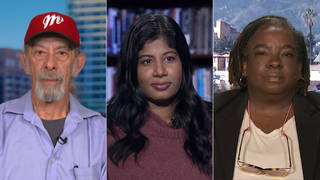
Topics
Rainforest Action Network is announcing it is ending its grassroots campaign against the world’s largest bank, Citigroup which has agreed to adopt a series of new environmental policies dealing with indigenous populations. [includes transcript]
- Ilyse Hogue, Director of the Rainforest Action Network’s Campaign for a Sane Economy, the campaign focuses on leading the corporate financial sector out of destructive activities and into environmentally sustainable and equitable, community-based alternatives.
Transcript
AMY GOODMAN: We wrap up today with the Rain Forest Action Network. Later today, the group is announcing its ending its grassroots campaign against the world’s largest bank, Citigroup. The bank has agreed to adopt a series of new environmental policies dealing with indigenous populations. Here to talk about this issue is Ilyse Hogue, director of the Rainforest Action Network’s Campaign for a Sane Economy. When you were with us, you were certainly going after Citibank. What happened?
ILYSE HOGUE: Well, about eight months ago, Citigroup came to us and said that they were concerned about their brand reputation suffering as a result of the grassroots activities around the world. I want to stress this was not just a U.S. campaign we were joined by partners in Peru, Ecuador and Indonesia. And I think that the results that we are seeing in the announcement today are going to benefit our allies around the world, as well as people at home. It is the most significant environmental policy to come out of the private financial sector to date. It’s going to put in place no-go zones–ecological areas that are so critical they are off limits to investment. As well as make the very first statement ever out of the private financial sector on climate change. As we see private finance investment in developing countries is increasing and dwarfing public finance there was not even the basic standards that you see in the World Bank or the I.M.F.–as well as we know that those are not enough. So what Citigroup did today was not only acknowledge that but surpass the public finance standards and set a new bar for the investment sector. So, we’re going to need to look at the rest of the investment sectors from Chase Manhattan to John Hancock Insurance who are sinking more and more money into the most egregious fossil fuel developments around the world and hold them to what we now see as the best practices in the industry.
JUAN GONZALEZ: Do the other groups around the world who have been participating in the campaign against Citigroup agree with this, or is this Rain Forest Action Network itself?
ILYSE HOGUE: We did extensive consultation. We had quite a long time to write the policy with Citigroup and what we did was extensive consultations with the groups that we had worked with. I think we are going to see that while everyone acknowledges it’s not enough to confront the magnitude of the problems that we’re facing, it is the most significant step to date that we have seen from a private bank.
AMY GOODMAN: We only have 30 seconds, but while you’re announcing the end of the campaign against Citigroup, you are issuing a new list of ten Wall Street institutions that have weak environmental policies. Who are they?
ILYSE HOGUE: No environmental policies, Amy. J.P. Morgan Chase (who just got the reconstruction contract in Iraq, by the way), Bank One, Bank of America, Fleet Boston Financial, Wells Fargo, Goldman Sachs, John Hancock, Wachovia, US Bancorp and SunTrust.
AMY GOODMAN: We will go into that on another day. We thank you for being with us, Ilyse Hogue of the Rainforest Action Network, announcing the end of their campaign against the world’s largest bank, Citigroup. That does it for the show.













Media Options